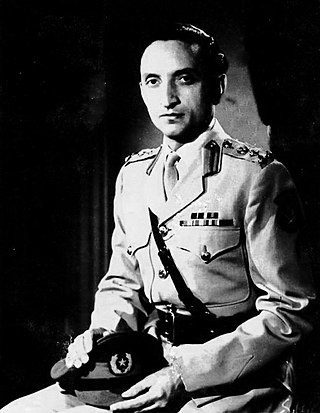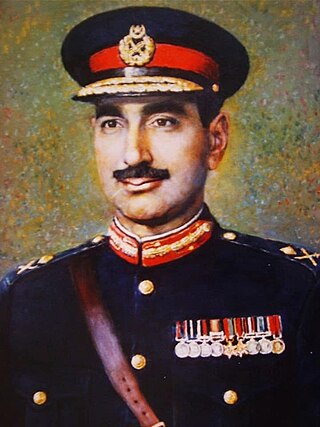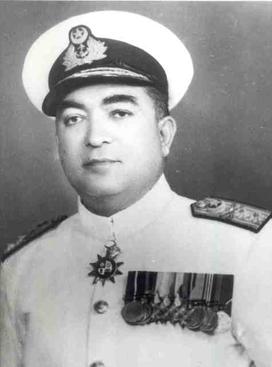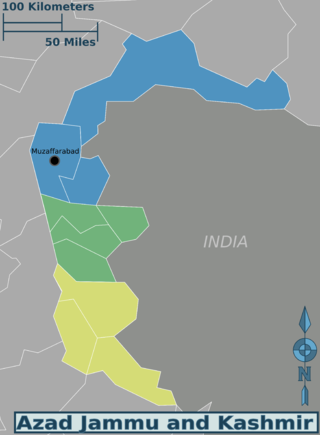
Muhammad Ayub Khan, widely known as Ayub Khan was a Pakistani army officer who served as the second president of Pakistan from 1958 to 1969. He previously served as the third Commander-in-Chief of the Pakistan Army from 1951 to 1958.

Lieutenant General Sahabzada Mohammad Yaqub Ali KhanSPk was a Pakistani politician, diplomat, military figure, linguist, and a retired general in the Pakistani Army.
Major General Akbar Khan, DSO (1912–1993) was a decorated officer of the British Indian Army and later Pakistan Army. He commanded the Kashmiri rebels and Pashtun irregulars in the First Kashmir War under the pseudonym 'General Tariq'. In 1951, he was convicted of an attempted coup that came to be known as the Rawalpindi Conspiracy, and served a five-year prison sentence. Later he served as the Chief of National Security under prime minister Zulfikar Ali Bhutto. Under his guidance, the Army quelled the Baloch Insurgency during the early mid-1970s.

General Bakht Khan (1797–1859) was the commander-in-chief of the Indian rebel forces in the city of Delhi during the Indian Rebellion of 1857 against the East India Company.
Khan is a surname of Turko-Mongol origin, today most commonly found in parts of India, Pakistan, Afghanistan, Bangladesh, Uzbekistan and Iran. It is derived from the historic title khan, referring to military chief or royalty. It originated as a hereditary title among nomadic tribes in the Central and Eastern Eurasian Steppe during antiquity and was popularized by Afghan dynasties in the rest of Asia as well as in Eastern Europe during the medieval period.

Major General Mohammad Iftikhar Khanpsc also known as Ifti, was a two-star general in the Pakistan Army serving as GOC 10th Division. Prior to the Partition of British India, he was an officer in the British Indian Army. He was the most senior to succeed General Douglas Gracey as the Commander-in-Chief of the Pakistan Army, but unfortunately was killed in a C-53 crash with 22 others, including his wife and infant daughter before he could take office leading to Ayub Khan being appointed instead.
Muhammed Akbar Khan, MBE PA-1 was a Pakistani general and at the time of the independence of Pakistan, he was the most senior Muslim General. He also served as the first Senior Military Secretary of the Quaid-e-Azam, Muhammed Ali Jinnah. He holds the distinguished honor of being the senior most officer of the Pakistan Army and holds Pakistan Army number PA-1.

4th Horse (Hodson's Horse) is a part of the Armoured Corps of the Indian Army, which had its beginnings as an irregular cavalry regiment during the time of the Indian Rebellion of 1857.
Sitara-e-Jurat is the third highest military award of Pakistan. It was established in 1957 after Pakistan became a republic; however, it was instituted retrospectively back to 1947. It is awarded for gallantry or distinguished service in combat; and can be bestowed upon officers, junior commissioned officers, petty officers, warrant officers, soldiers, sailors, airmen, and equivalents in the Pakistan Army, Navy, Air Force, and various paramilitary forces under federal control, such as the Frontier Corps, the Frontier Constabulary, and the Pakistan Rangers. It may be considered to be roughly equivalent to the Military Cross and the Silver Star.
Akbar Khan may refer to the following in South Asia:

Major General Raja Muhammad Anwar KhanHJ was the first Pakistan Army Engineer Officer and the first Muslim Engineer In Chief of the Pakistan Army. He was the first Muslim to be a Sapper officer in the British Indian Army and its pre-partition Indian Corps of Engineers. His Pakistan Army number was 48 (PA-48).

Vice Admiral Afzal Akram Rahman Khan, HQA, HPk, HJ, was a Pakistan Navy admiral, politician, and the Commander in Chief of the Pakistan Navy, serving under President Ayub Khan from 1959 until 1966. He is noted for being the longest serving commander-in-chief of navy and was responsible for launching and introducing the submarine program in the navy.
Lieutenant General Zahid Ali AkbarHI(M), SBt, PE, is a former engineering officer in the Pakistan Army Corps of Engineers, known for his role in Pakistan's acquisition of nuclear weapons, and directing the Engineering Research Laboratories (ERL), a top secret research facility developing the clandestine atom bomb project.
Lieutenant Colonel Qazi Altaf Hussain (1920–1999) served in the British Indian Army later taking up a place in the Army of Pakistan. He advanced to various positions of leadership during his military career, serving as lieutenant colonel of the 11 Frontier Force Regiment, commandant of the Zhob Militia in Quetta, Pakistan, and commander of a regiment in the Indo-Pakistani War of 1965. He was forced to retire as a lieutenant colonel, instead of advancing to general, as a result of his short-tempered, frank and outspoken nature.

Air Commodore Muhammad Zafar Masud also known as Mitty Masud, was a one star air officer in the Pakistan Air Force and a military strategist who was known for his role as air officer commanding of the Dacca airbase in East Pakistan.
The Janjua is a Punjabi Rajput clan found predominantly in the Pothohar Plateau of Pakistani Punjab.

In spring 1947, an uprising against the Maharaja Hari Singh of Jammu and Kashmir broke out in the Poonch jagir, an area bordering the Rawalpindi district of West Punjab and the Hazara district of the North-West Frontier Province in the future Pakistan. It was driven by grievances such as high taxes, the Maharaja's neglect of World War veterans, and above all, Muslim nationalism with a desire to join Pakistan. The leader of the rebellion, Sardar Muhammad Ibrahim Khan, escaped to Lahore by the end of August 1947 and persuaded the Pakistani authorities to back the rebellion. In addition to the backing, Prime Minister Liaquat Ali Khan authorised an invasion of the state, by the ex-Indian National Army personnel in the south and a force led by Major Khurshid Anwar in the north. These invasions eventually led to the First Kashmir War fought between India and Pakistan, and the formation of Azad Kashmir provisional government. The Poonch jagir has since been divided across Azad Kashmir, administered by Pakistan and the state of Jammu and Kashmir, administered by India.








